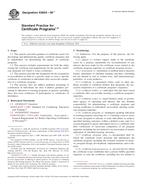Potrebujeme váš súhlas na využitie jednotlivých dát, aby sa vám okrem iného mohli ukazovať informácie týkajúce sa vašich záujmov. Súhlas udelíte kliknutím na tlačidlo „OK“.
ASTM E2659-09e1
Standard Practice for Certificate Programs (Includes all amendments And changes 4/10/2015).
Automaticky preložený názov:
Štandardné praktiky pre programy certifikátu
NORMA vydaná dňa 1.4.2009
Informácie o norme:
Označenie normy: ASTM E2659-09e1
Poznámka: NEPLATNÁ
Dátum vydania normy: 1.4.2009
Kód tovaru: NS-45824
Počet strán: 6
Približná hmotnosť: 18 g (0.04 libier)
Krajina: Americká technická norma
Kategória: Technické normy ASTM
Anotácia textu normy ASTM E2659-09e1 :
Keywords:
certificate, certificate program, continuing education, credentialing, education, learning, training, Certificate programs, Continuing education, Learning, Training programs, ICS Number Code 03.120.20 (Product and company certification. Conformity assessment)
Doplňujúce informácie
| Significance and Use | ||
|
Certificate programs are typically offered by community colleges and universities, government agencies, employers, independent for-profit training organizations, and professional and trade associations. While quality guidelines do exist for continuing education and training providers in general (for example, ANSI/IACET 1-2007) and for entities offering personnel certification programs (for example, ANSI/ISO/IEC 17024:2003), currently, no quality guidelines exist specifically to aid entities offering certificate programs. This practice aims to change that and has been developed to: Provide certificate program developers and certificate issuers guidelines for quality program development and administration; Form the foundation for a recognition or accreditation system or both that enable consumers, employers, government agencies, and others who rely upon a skilled workforce to distinguish between qualified workers and those with fraudulent or less-than-quality credentials; Assist stakeholders in differentiating between certificate programs from personnel certification; and Assist stakeholders in differentiating certificate programs from other programs that confer certificates, including but not limited to certificates of attendance or certificates of participation. Currently, it is challenging to distinguish a certificate earned through the focused learning and assessment offered through a certificate program from one granted through other means. That a certificate is issued is not a distinguishing factor. The word “certificate” is used broadly as a document awarded to designate the attainment or completion of something. An individual might receive a certificate from an education or training provider as verification of attendance at a learning event (often called a certificate of attendance) or receive a certificate as verification of active participation in a learning event’s learning experiences (often called a certificate of participation). The distribution of a certificate, however, does not indicate that the education or training program completed was a certificate program. In a certificate program, an individual participates in a learning event or series of events designed to assist him or her in achieving specified learning outcomes within a defined scope; the individual receives a certificate only after verification of successful completion of all program requisites including but not limited to an evaluation of learner attainment of intended learning outcomes. It is also important to distinguish certificate programs from the certification of individuals. Certification is a process through which a nongovernmental entity grants a time-limited recognition to an individual after verifying that he or she has met established criteria for proficiency or competency, usually through an eligibility application and assessment. While certification eligibility criteria may specify a certain type or amount of education or training, the learning event(s) are not typically provided by the certifying body. Instead, the certifying body verifies education or training and experience obtained elsewhere through an application process and administers a standardized assessment of current proficiency or competency. In contrast, in a certificate program the learning event(s) and the assessment(s) are both developed and administered by the certificate issuer, and there is an essential link between them. That is, the learning event(s) are designed to help participants achieve learning outcomes and the assessment is designed to evaluate the learners’ attainment of those intended learning outcomes. Also, certifications have ongoing requirements for maintaining proficiency/competency and can be revoked for not meeting these ongoing requirements. In contrast, certificates do not have ongoing maintenance or renewal requirements and therefore, cannot be revoked. |
||
| 1. Scope | ||
|
1.1 This practice provides guidance to certificate issuers for developing and administering quality certificate programs and to stakeholders for determining the quality of certificate programs. 1.2 This practice includes requirements for both the entity issuing the certificate and requirements for the specific certificate programs for which it issues certificates. 1.3 This practice provides the foundation for the recognition or accreditation or both of a specific entity to issue a specific certificate or certificates to individuals after successful completion of a certificate program. 1.4 This practice does not address guidance pertaining to certification of individuals nor does it address guidance pertaining to education or training programs in general, including those that issue certificates of participation or certificates of attendance. |
||
| 2. Referenced Documents | ||
|
Odporúčame:
EviZak - všetky zákony vrátane ich evidencie na jednom mieste
Poskytovanie aktuálnych informácií o legislatívnych predpisoch vyhlásených v Zbierke zákonov od roku 1945.
Aktualizácia 2x v mesiaci !
Chcete vedieť viac informácii ? Pozrite sa na túto stránku.




 Cookies
Cookies
